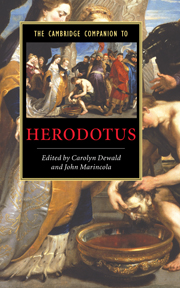Book contents
- Frontmatter
- Introduction
- 1 Herodotus and the poetry of the past
- 2 Herodotus and his prose predecessors
- 3 Herodotus and tragedy
- 4 The intellectual milieu of Herodotus
- 5 Meta-historiē: Method and genre in the Histories
- 6 The syntax of historiē: How Herodotus writes
- 7 Speech and narrative in the Histories
- 8 Herodotus, Sophocles and the woman who wanted her brother saved
- 9 Stories and storytelling in the Histories
- 10 Humour and danger in Herodotus
- 11 Location and dislocation in Herodotus
- 12 Herodotus and the natural world
- 13 Herodotus and Greek religion
- 14 Warfare in Herodotus
- 15 Herodotus, political history and political thought
- 16 Herodotus and the cities of mainland Greece
- 17 An alternate world: Herodotus and Italy
- 18 Herodotus and Persia
- 19 Herodotus and foreign lands
- 20 Herodotus' influence in antiquity
- Glossary
- Timeline
- Bibliography
- Index
- Series List
16 - Herodotus and the cities of mainland Greece
Published online by Cambridge University Press: 28 January 2007
- Frontmatter
- Introduction
- 1 Herodotus and the poetry of the past
- 2 Herodotus and his prose predecessors
- 3 Herodotus and tragedy
- 4 The intellectual milieu of Herodotus
- 5 Meta-historiē: Method and genre in the Histories
- 6 The syntax of historiē: How Herodotus writes
- 7 Speech and narrative in the Histories
- 8 Herodotus, Sophocles and the woman who wanted her brother saved
- 9 Stories and storytelling in the Histories
- 10 Humour and danger in Herodotus
- 11 Location and dislocation in Herodotus
- 12 Herodotus and the natural world
- 13 Herodotus and Greek religion
- 14 Warfare in Herodotus
- 15 Herodotus, political history and political thought
- 16 Herodotus and the cities of mainland Greece
- 17 An alternate world: Herodotus and Italy
- 18 Herodotus and Persia
- 19 Herodotus and foreign lands
- 20 Herodotus' influence in antiquity
- Glossary
- Timeline
- Bibliography
- Index
- Series List
Summary
This much I know: if everyone in the world were to bring his own evils along to market to barter them with his neighbours, a glimpse of his neighbours’ evils would make him happy to take back home those he had brought. The Argives didn’t act more shamefully than others.
(Hdt. 7.152)Herodotus no doubt violated the expectations of his Spartan, Athenian, Theban, and Corinthian audiences. Reading his written text, they discovered that when he promised to 'travel through both small and large “cities of men” ' (1.5.3), he would have much to say about Lydia, Egypt, Persia, Scythia, and Libya, but not give their own cities a major part until Book 5, half-way through the Histories, and even then in a curiously fragmented and disjointed manner. Only with the sequence of grand battles against the Persians (7.131-9.113) do the Greek cities come to centre stage.
The structure of Herodotus' written history - and no doubt the topics of many of his oral performances - shifted the perspective of his audience from their own civic world and inter-city rivalries to a much broader view in space and time. Herodotus, after all, was in several ways an outsider. Born in Halicarnassus, a tributary state first of Persia, then of Athens, into a mixed Carian-Greek family, he left his city as an exile and travelled extensively in both Greek and non-Greek lands, until he settled in the new Athenian sponsored but panhellenic city of Thurii on the heel of Italy. A marginal figure, half Greek, half barbarian, he could view the events of mainland Greece with a curious but detached eye. As he composed his history c. 445- 428 BCE, Greece was convulsed by the rivalry, and finally the open war, of Sparta and Athens. This contemporary conflict furnished a sharp contrast to the united effort which had driven off the invader in 480-479, but a keen observer could see the roots of the later clash even in that heroic moment.
- Type
- Chapter
- Information
- The Cambridge Companion to Herodotus , pp. 242 - 256Publisher: Cambridge University PressPrint publication year: 2006
- 26
- Cited by

